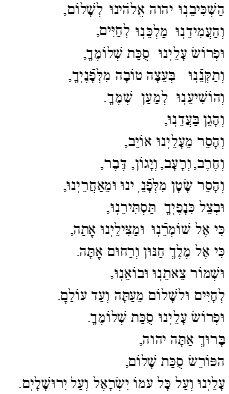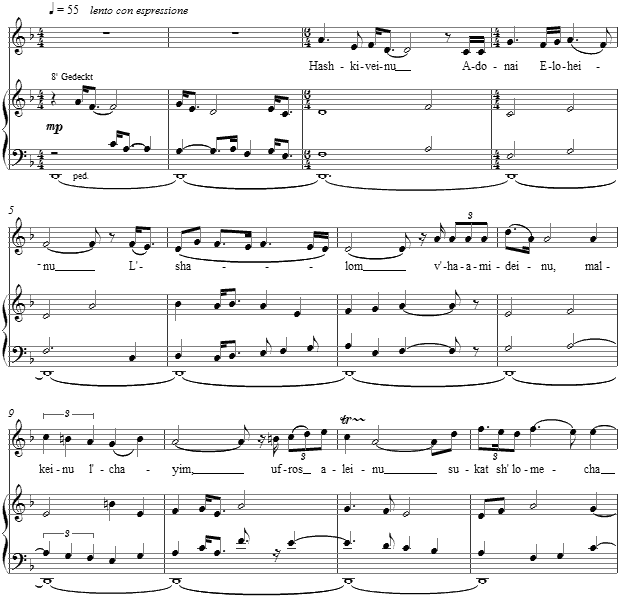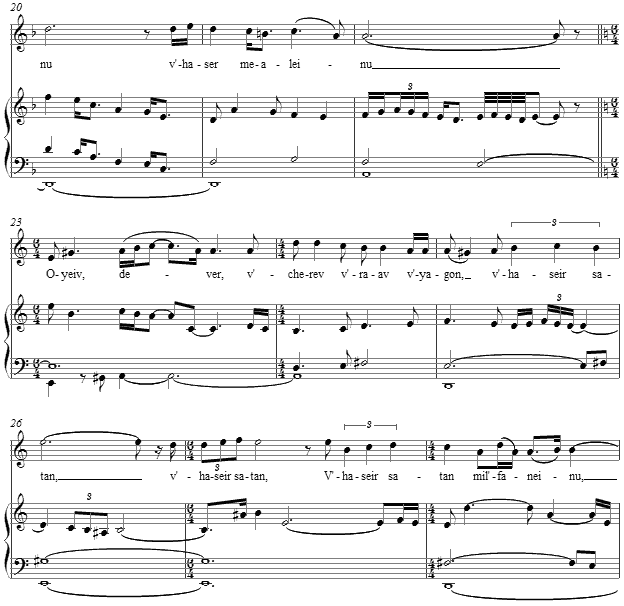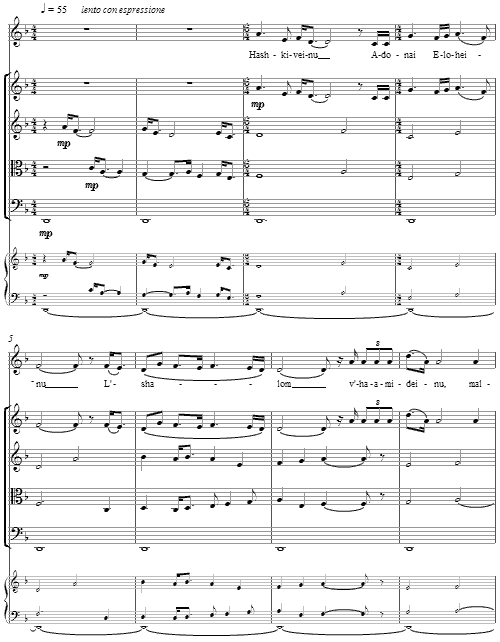Music and Texts of GARY BACHLUND
Vocal Music | Piano | Organ | Chamber Music | Orchestral | Articles and Commentary | Poems and Stories | Miscellany | FAQs
Hashkiveinu - (2010)
text from the Siddur
for medium or high voice and organ or string quartet
After a theme by Cantor Mark Goodman
[ 4 pages, circa 4' 20" ]
Lay us down to sleep, Lord our God, in peace, raise us erect, our King, to life; and spread over us the shelter of Your peace. Set us aright with good counsel from before Your Presence, and save us for Your Name's sake. Shield us, remove from us foe, plague, sword, famine, and woe; and remove spiritual impediment from before us and behind us and in the shadow of Your wings shelter us for it is you Lord who protects and rescues us; for you are Lord, the Gracious and Compassionate King. Safeguard our going and coming - for life and for peace from now to eternity. And spread over us the shelter of Your peace. Blessed are You, Lord our God, who spreads the shelter of peace upon us, upon all of his people Israel and upon Jerusalem.
One verse in the blessing, translated above as "remove spiritual impediment from before us and behind us," may have a meaning that goes beyond the sense of physical danger. The word often translated as "spiritual impediment" is also and perhaps better thought of as "adversary" rendered in the Hebrew text by the word satan. In the Hebraic idiom, this word does not mean a figure like unto the various Christian images of the personage of "Satan," the Lucifer which fights against God. Judaism traditionally recognizes no independent spiritual power other than God. "Satan" in the text therefore refers to the evil impulses within man. For this I keep in mind that men are most often evil to other men, which seems to populate my narrative with many small devilish men and women throughout of common history.
As a meditation on peace, the setting begins quietly, the three voices introducing the "snap" rhythm which follows in the vocal line. Throughout, the accompaniment is in three voices, underpinning the cantorial lyricism above.
The shift from D minor leads to a key change, as this meditation for peace changes to E into another cadence on A, and the emergence of D major as against the earlier D melodic minor. The setting ends on C, as the tonal regions drop a step from the beginning.
The setting is also available for string quartet, the first violin doubling the vocal line. It was thought to complete a Shabbat setting of many texts for string quartet and solo vocal line. Perhaps this will come in time, now that this setting is engraved. The organ accompaniment then doubles the bottom three strings, and is possible for other keyboard instruments as well. For string parts, please contact me through the email address found on the page, Contact Information.
Rabbi Mark Goodman
Rabbi and Cantor Mark Goodman holds both Rabbinical and Cantorial Ordination from the Academy for Jewish Religion/CA (AJR). Additionally he is Adjunct Professor of Jewish History and Religion at Los Angeles Valley College. Goodman received his B.A. in English from UCLA. He holds Master’s degrees in Music from California State University at Los Angeles, in Jewish Studies from Spertus Institute, in Rabbinics from the AJR and in Sacred Music from the AJR. He is currently enrolled (2010) in the Doctoral program at Spertus Institute for Jewish Studies. He had written a single vocal line which I adapted into this setting, in part in tribute to his perseverance and proven accomplishments since 2000, when this setting was completed. He is also father to two fine adopted sons, proving his days are very full indeed.
The scores are available as a free PDF download, though any major commercial performance or recording of the work is prohibited without prior arrangement with the composer. Click on the graphic below for this piano-vocal score and chamber version.




